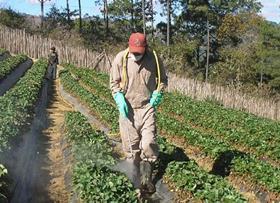
The Philippines Department of Health yesterday recommended the banning of all aerial pesticide spraying in the country, saying the practice was damaging to the environment and harmful to the health of those living close to farmlands.
In a statement, the Department quoted studies showing that all methods of pesticide spraying were affected by ‘drift’, but said the problem was greatest with aerial spraying where as much as 40 per cent could miss the target.
The statement claimed that schools and residential areas close to banana plantations were exposed to considerable risk due to spray drift and post application drift, the Philippine Star reported.
International studies by the World Health Organisation claim some of the chemicals used in banana spraying can cause severe allergic reactions in humans and are toxic to marine life.
But the recommendation has been met with resistance from banana workers, who say more research needs to be undertaken to prove that aerial spraying is any more harmful than other methods of pest control.
Vice President of the Southern Mindanao Labour Group Jesus Pagaran said the 2006 study that formed the basis of yesterday’s announcement was outdated.
“The WHO’s pesticide experts reiterated that based on the document given to them, the conclusion to ban aerial spraying is not supported by adequate data,” he said.






No comments yet